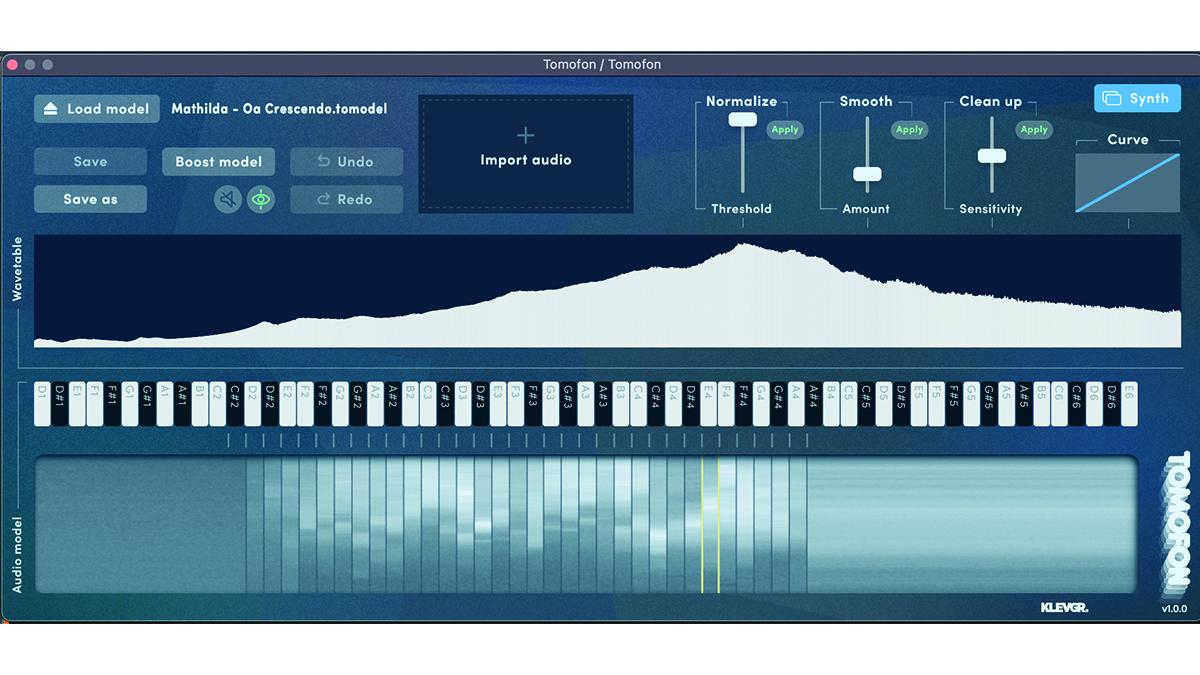MusicRadar Verdict
Klevgrand’s most substantial release to date is both powerful and fun. Great for experimental textures and cinematic sounds.
Pros
- +
Capable of realistic results as well as experimental fun.
- +
Multiple voices and modulation options.
- +
Easy-to-use editor for importing audio.
Cons
- -
Low-pass filter only.
- -
Filter modulation can be confusing.
MusicRadar's got your back
Klevgrand Tomofon: What is it?
- Key Features: Polyphonic audio synthesizer that blends elements of sampling and wavetable synthesis. Features four independent voices, low pass ladder filter, delay, reverb, and master EQ.
- Buy at: Plugin Boutique
Prolific Swedish developer Klevgrand has released a real variety of plugins in recent years, although most have tended to be fairly small-scale and focused. Tools such as the Rum room emulator, Skaka percussion sampler and Fosfat ‘transient fertiliser’ have each focused on a fairly niche element of the production workflow, albeit usually in innovative and slightly kooky ways.
Tomofon is by far the developer’s most substantial release to date. This is a virtual synth that blends elements of sampling and wavetable synthesis to create what Klevgrand calls a ‘real audio synth’.
In practice, this works by taking an audio file and slicing it into small chunks, which are then mapped across various pitch zones. Each pitch on the keyboard has multiple layers, so the results are kind of like having an individual wavetable for each pitch zone.

Klevgrand Tomofon: Performance and verdict
Tomofon comes stocked with a healthy crop of pre-sliced audio files, but it’s more fun to make use of your own samples. This is done using the easy-to-navigate editor window, where users can drag and drop audio files, which are analysed and mapped to pitch zones. Tomofon offers a good level of editing in order to fine tune the results. Zones can be remapped using a Kontakt-like layer editor, which is joined by controls to normalise, smooth and clean up the wavetables, plus a curve editor for adjusting how each pitch zone moves through its tables.

A prompt instructs users to avoid uploading polyphonic or percussive source material, although some of the most fun I’ve had has been with these kinds of ‘wrong’ material. Importing a distorted hi-hat loop, for example, created an icy and metallic, if – as I was warned – unpredictable synth sound. One very nice touch is that Tomofon lets users merge audio files, in order to blend elements of multiple imported samples, which can result in some wonderful cinematic textures.
The synth side of Tomofon is powerful too. The plugin has four polyphonic voices that can be pitched, modulated and panned independently. Each has ADSR envelopes for gain, depth (ie wavetable position), pitch and filter cutoff. The sustain stage of these envelopes is set to always loop, which can be used to create some interesting LFO-like effects.
Modulation of Tomofon’s low-pass resonant ladder filter takes a little getting used to, as there’s no strength/depth parameter for the envelope, which also works subtractively – ie, in the opposite direction to most synth filter envelopes. Once this has been understood though, it’s flexible enough (although modes other than low-pass would be nice.)
Want all the hottest music and gear news, reviews, deals, features and more, direct to your inbox? Sign up here.
There’s also a mod matrix that allows users to route velocity, keymapping and two control inputs. The sound is finished off with reverb and delay modules and a master EQ. Depth and pitch also have LFOs to make use of, including sample & hold for randomisation.
While it looks deceptively slight, Tomofon contains a lot of sound design potential, which becomes clear even within the first few minutes of messing around with it. Those who want to put the extra time in with the editor can create some really expressive and lifelike instrument timbres, although there’s also a lot of quick and easy fun to be had for those who just want to mess around with weird audio sources too – and they will often be rewarded with truly epic results for their efforts to boot.
MusicRadar verdict: Klevgrand’s most substantial release to date is both powerful and fun. Great for experimental textures and cinematic sounds.
Klevgrand Tomofon: The web says
"Tomofon is an impressive leap forward for Klevgrand. The Audio Model sound engine is breathtaking in sound and great fun to play with."
MusicTech
Klevgrand Tomofon: Hands-on demos
Klevgrand
Polarity Music
Implied Music
Klevgrand Tomofon: Specifications
- KEY FEATURES: Polyphonic audio synthesiser that blends elements of sampling and wavetable synthesis. Features four independent voices, low pass ladder filer, delay, reverb and master EQ.
- CONTACT: Klevgrand
I'm the Managing Editor of Music Technology at MusicRadar and former Editor-in-Chief of Future Music, Computer Music and Electronic Musician. I've been messing around with music tech in various forms for over two decades. I've also spent the last 10 years forgetting how to play guitar. Find me in the chillout room at raves complaining that it's past my bedtime.
